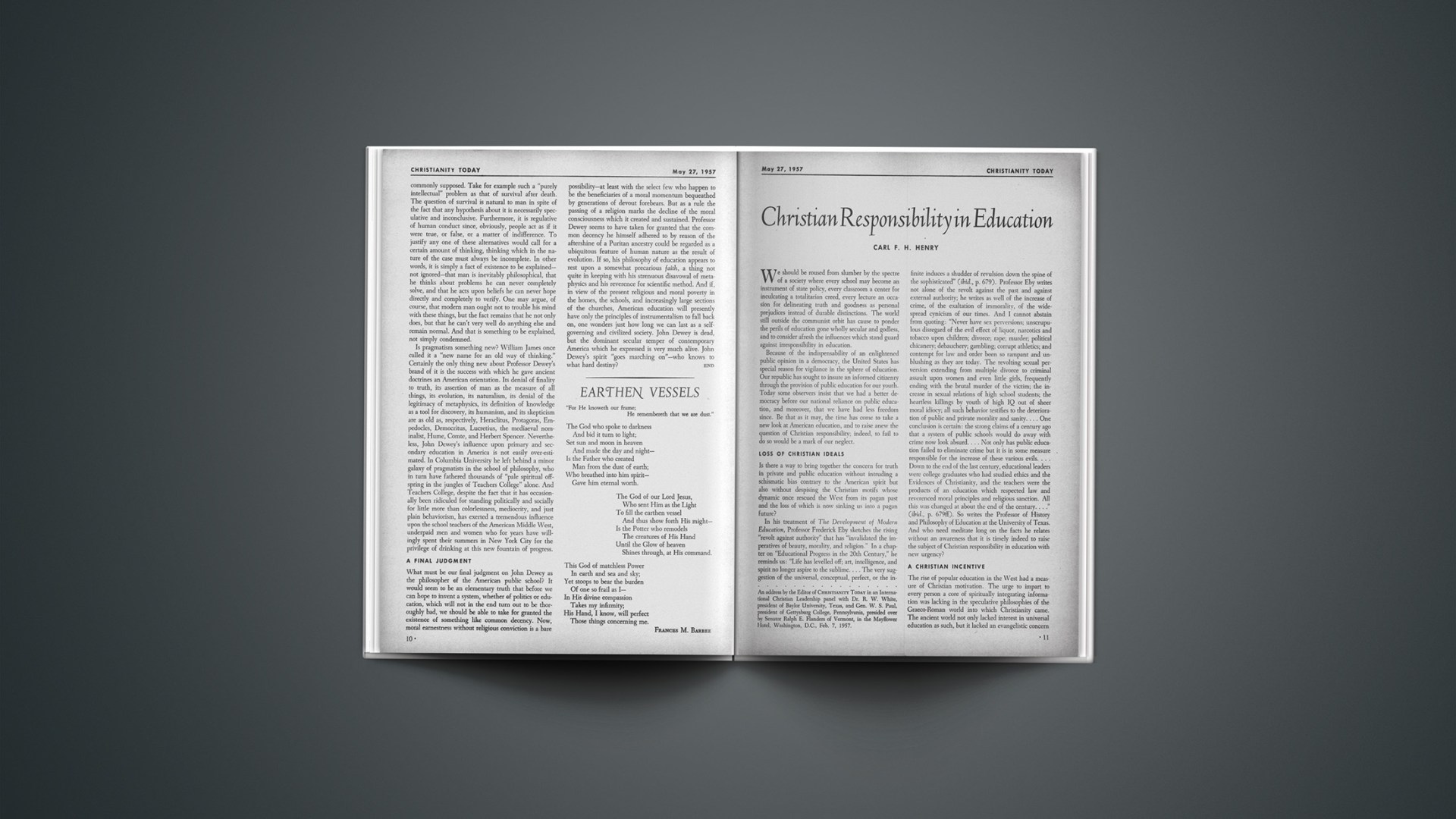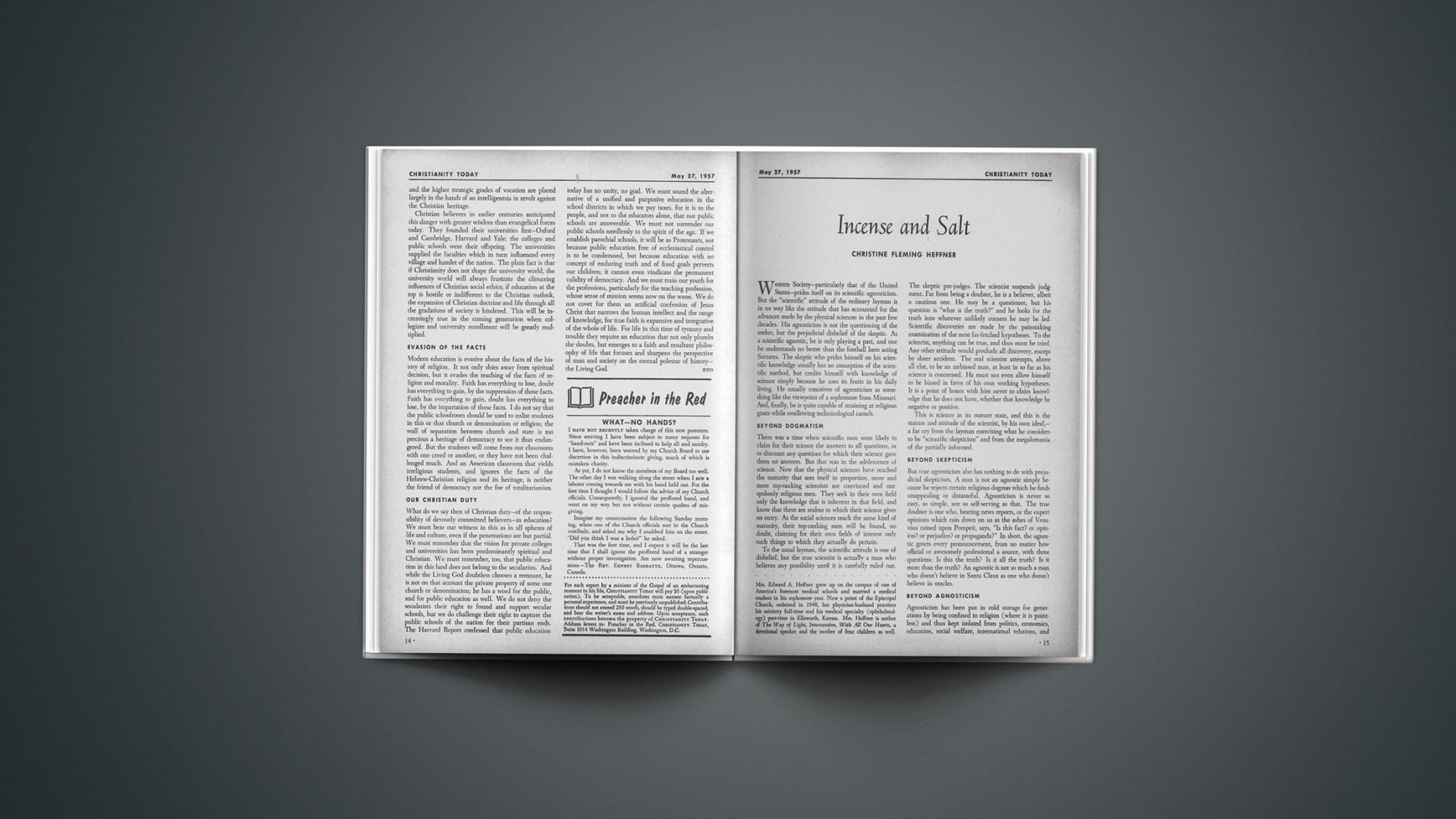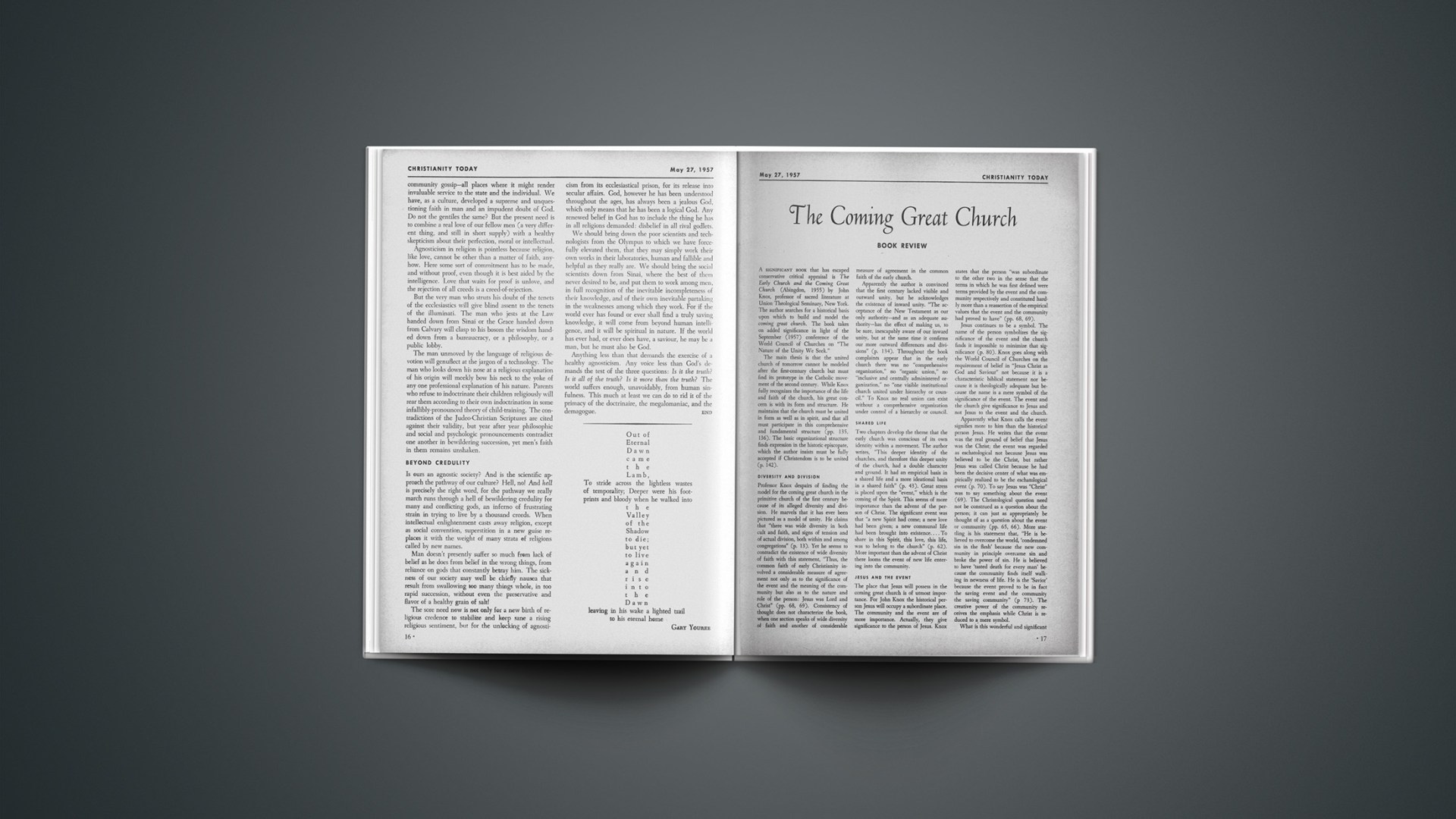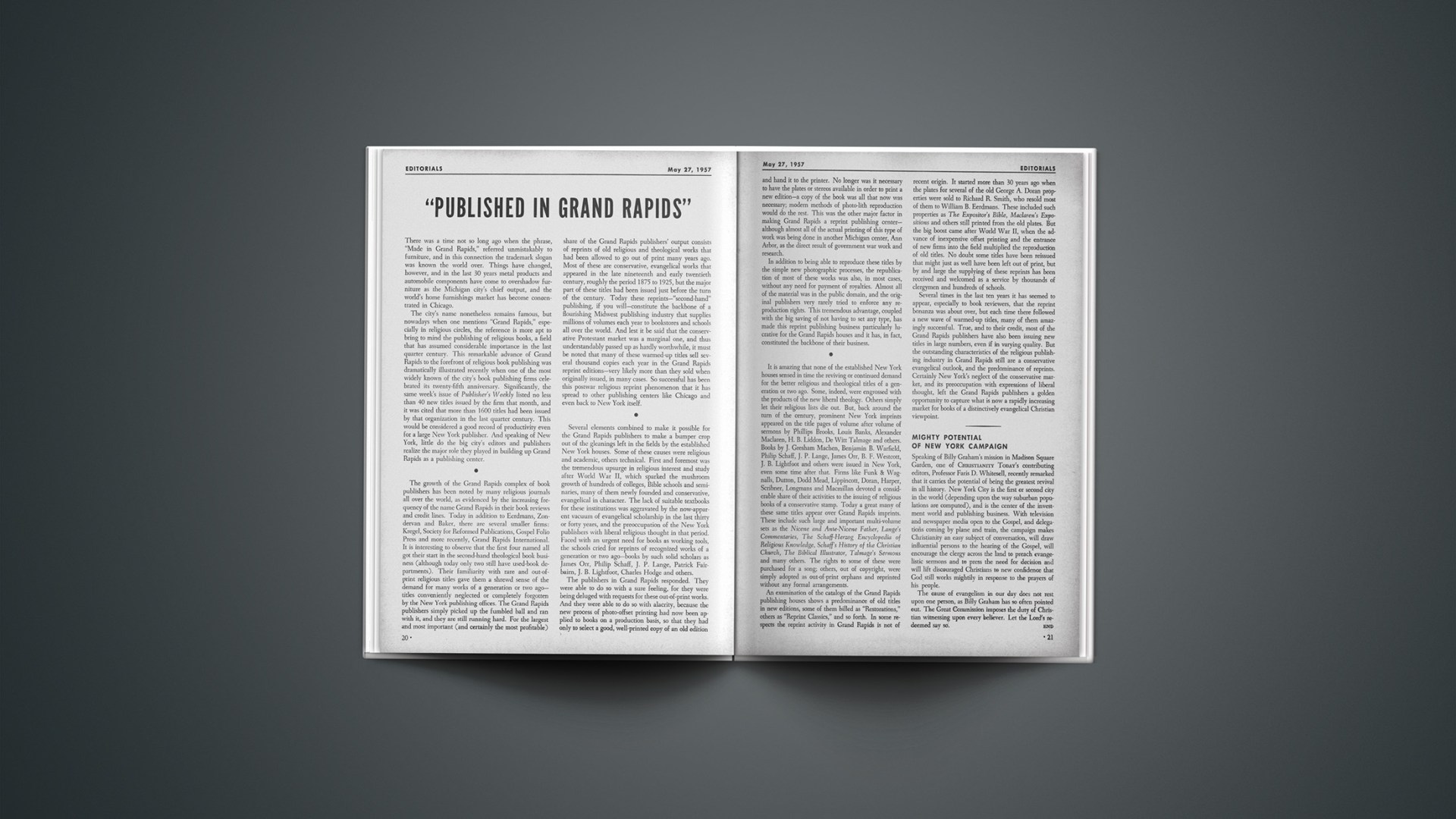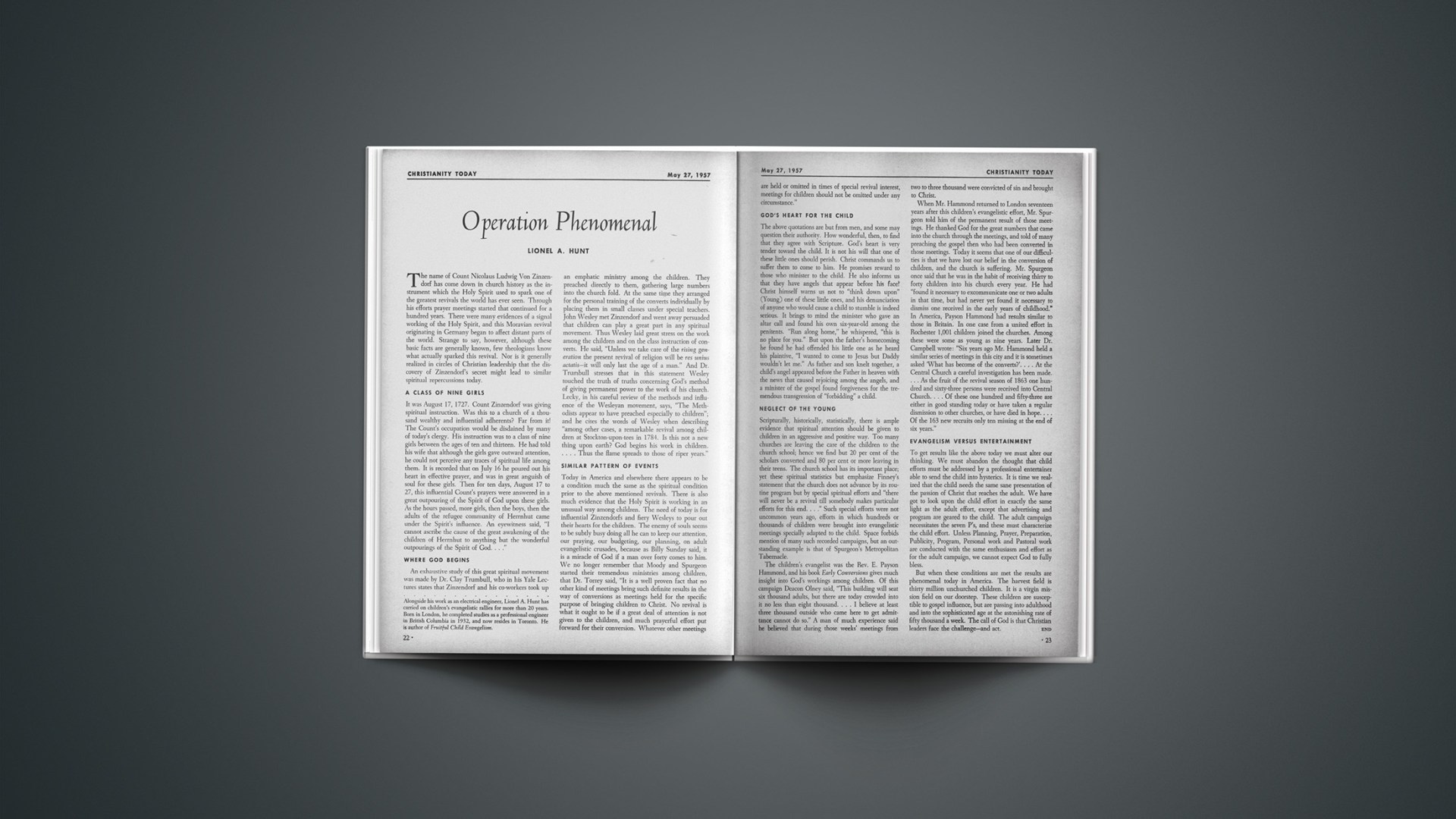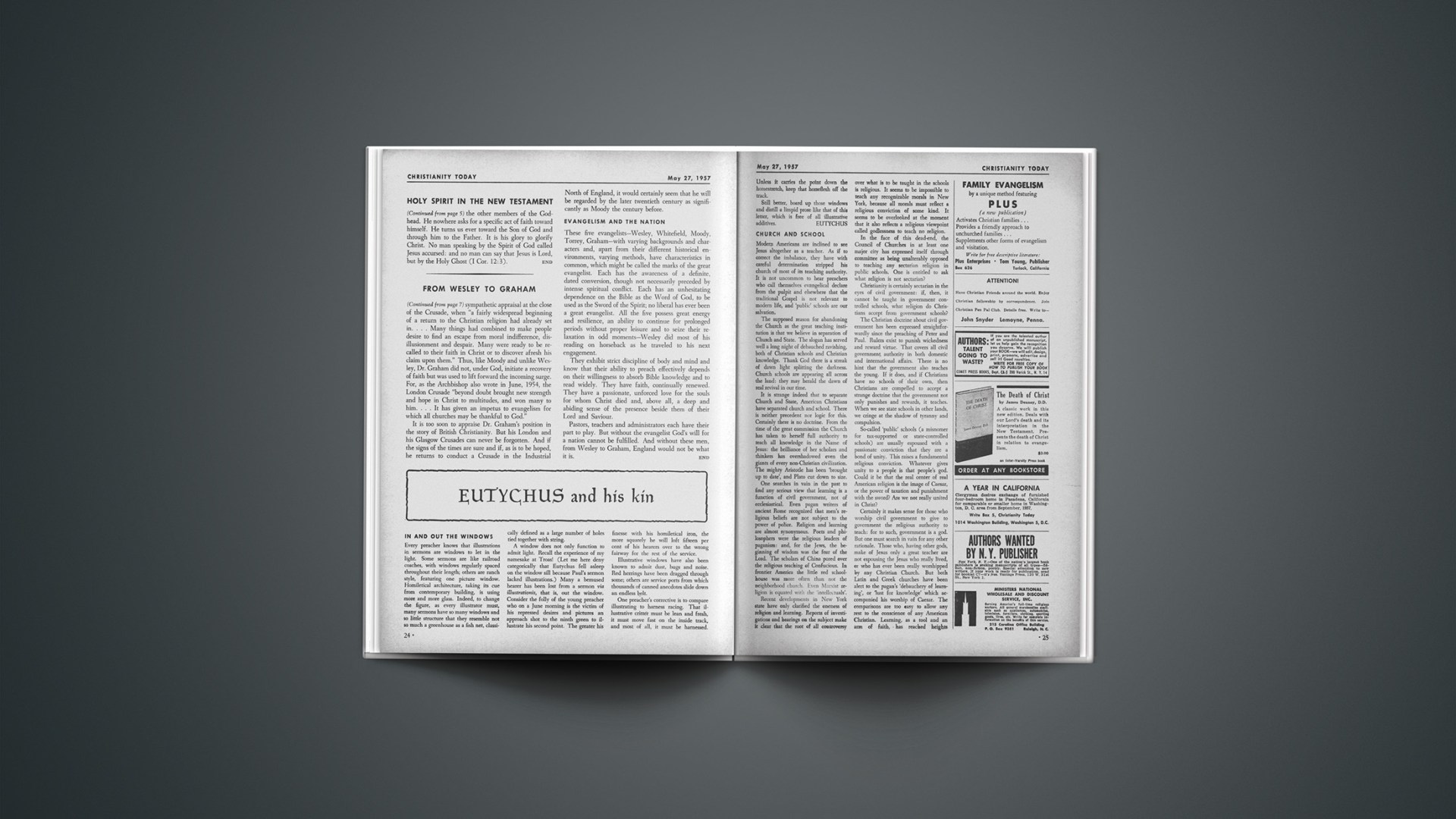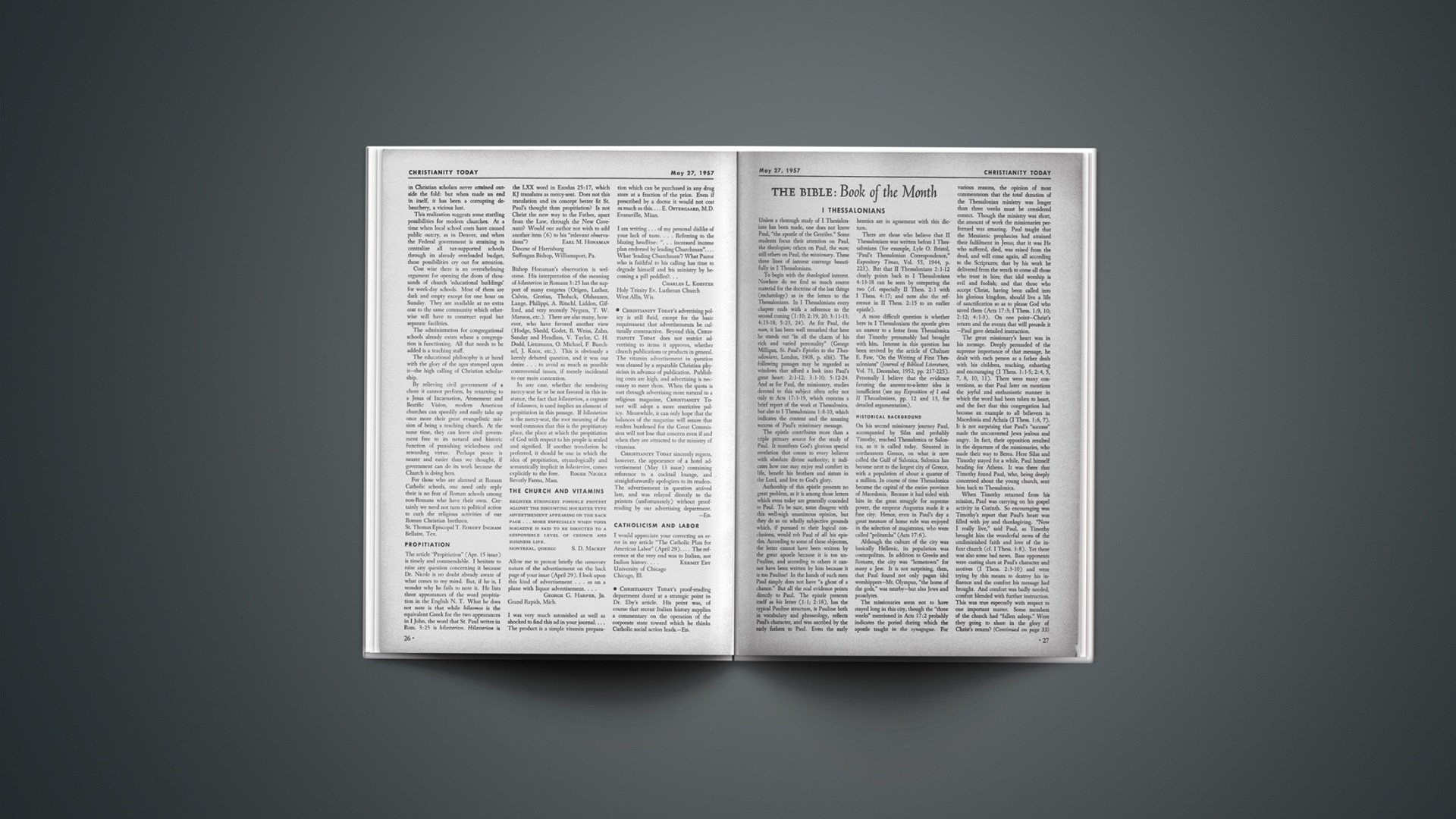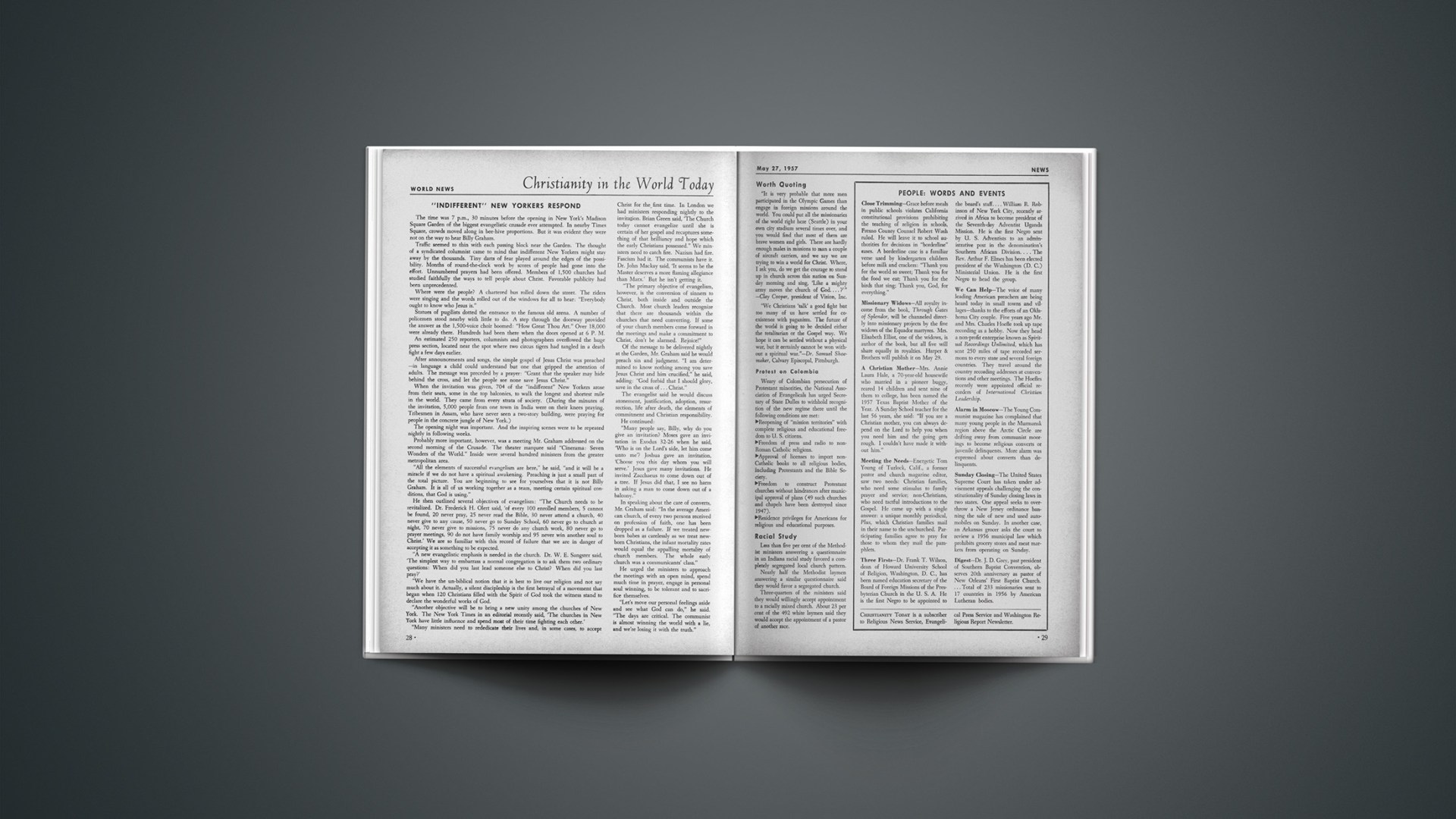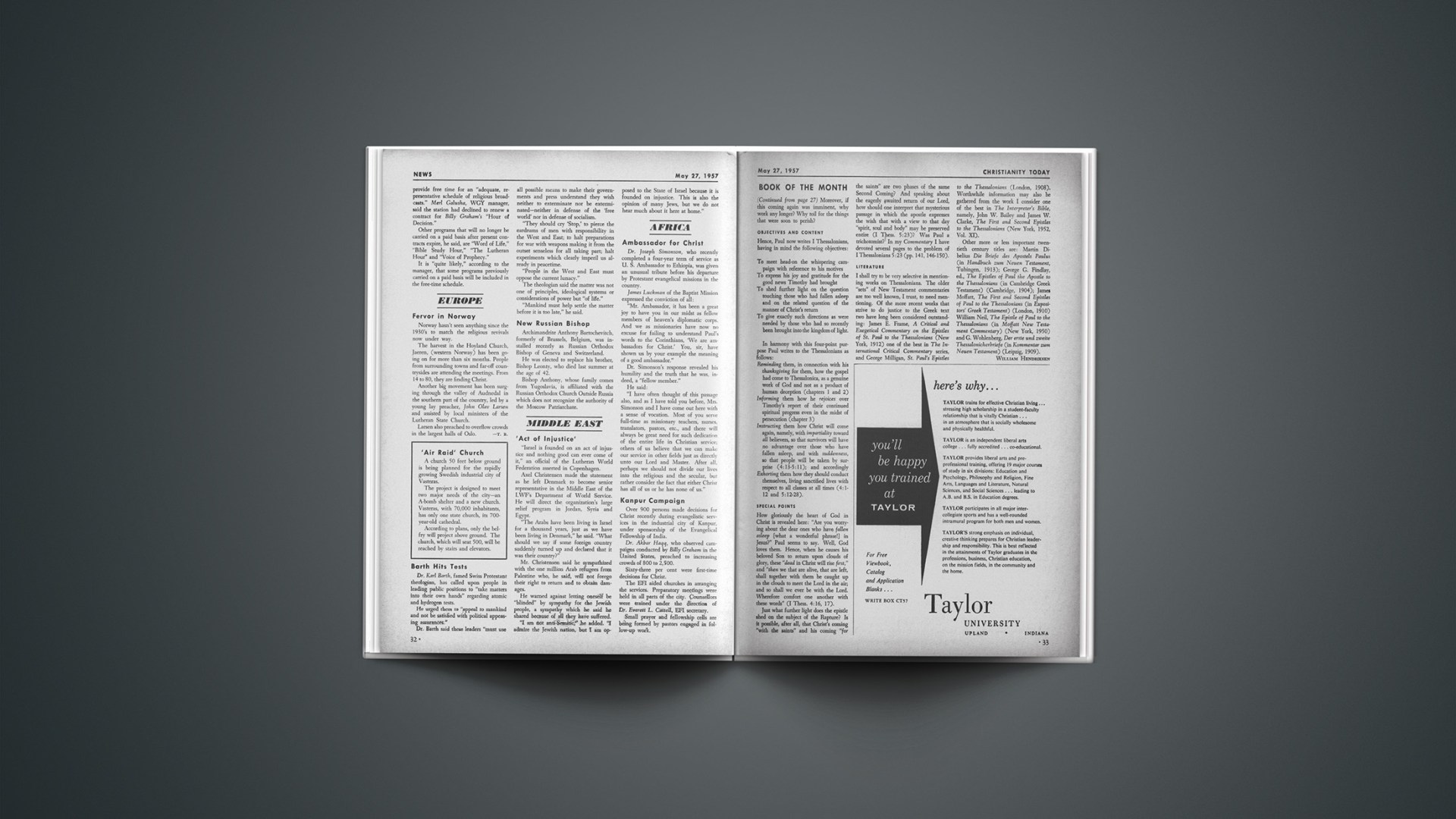We should be roused from slumber by the spectre of a society where every school may become an instrument of state policy, every classroom a center for inculcating a totalitarian creed, every lecture an occasion for delineating truth and goodness as personal prejudices instead of durable distinctions. The world still outside the communist orbit has cause to ponder the perils of education gone wholly secular and godless, and to consider afresh the influences which stand guard against irresponsibility in education.
Because of the indispensability of an enlightened public opinion in a democracy, the United States has special reason for vigilance in the sphere of education. Our republic has sought to insure an informed citizenry through the provision of public education for our youth. Today some observers insist that we had a better democracy before our national reliance on public education, and moreover, that we have had less freedom since. Be that as it may, the time has come to take a new look at American education, and to raise anew the question of Christian responsibility; indeed, to fail to do so would be a mark of our neglect.
Loss Of Christian Ideals
Is there a way to bring together the concern for truth in private and public education without intruding a schismatic bias contrary to the American spirit but also without despising the Christian motifs whose dynamic once rescued the West from its pagan past and the loss of which is now sinking us into a pagan future?
In his treatment of The Development of Modern Education, Professor Frederick Eby sketches the rising “revolt against authority” that has “invalidated the imperatives of beauty, morality, and religion.” In a chapter on “Educational Progress in the 20th Century,” he reminds us: “Life has levelled off; art, intelligence, and spirit no longer aspire to the sublime.… The very suggestion of the universal, conceptual, perfect, or the infinite induces a shudder of revulsion down the spine of the sophisticated” (ibid., p. 679). Professor Eby writes not alone of the revolt against the past and against external authority; he writes as well of the increase of crime, of the exaltation of immorality, of the widespread cynicism of our times. And I cannot abstain from quoting: “Never have sex perversions; unscrupulous disregard of the evil effect of liquor, narcotics and tobacco upon children; divorce; rape; murder; political chicanery; debauchery; gambling; corrupt athletics; and contempt for law and order been so rampant and unblushing as they are today. The revolting sexual perversion extending from multiple divorce to criminal assault upon women and even little girls, frequently ending with the brutal murder of the victim; the increase in sexual relations of high school students; the heartless killings by youth of high IQ out of sheer moral idiocy; all such behavior testifies to the deterioration of public and private morality and sanity.… One conclusion is certain: the strong claims of a century ago that a system of public schools would do away with crime now look absurd.… Not only has public education failed to eliminate crime but it is in some measure responsible for the increase of these various evils.… Down to the end of the last century, educational leaders were college graduates who had studied ethics and the Evidences of Christianity, and the teachers were the products of an education which respected law and reverenced moral principles and religious sanction. All this was changed at about the end of the century.…” (ibid., p. 679 ff). So writes the Professor of History and Philosophy of Education at the University of Texas. And who need meditate long on the facts he relates without an awareness that it is timely indeed to raise the subject of Christian responsibility in education with new urgency?
A Christian Incentive
The rise of popular education in the West had a measure of Christian motivation. The urge to impart to every person a core of spiritually integrating information was lacking in the speculative philosophies of the Graeco-Roman world into which Christianity came. The ancient world not only lacked interest in universal education as such, but it lacked an evangelistic concern for the masses which might have stimulated and reinforced this. The ideal of mass education enlarged through the Middle Ages, through the Reformation, and through the Renaissance with its fresh concern for the course of this world.
Christian interest in general education and in the democratic process, however, looked beyond a secular exposition of man and society; it incorporated from the very first a concern for life on this planet fit also for the world to come. In the early American colonies, all education was Christian. When public schools emerged after the Revolution, the famed McGuffey readers preserved this sense of citizenship in two worlds. The Christian churches, moreover, likewise established higher education in America. Harvard was the first of a large number of colleges founded by the churches, with the special aim of an educated ministry. Two out of three of the colleges existing in the United States this very day were established by the churches.
The Tragic Decline
By the time of the first World War, the character of many of these colleges was only formally Christian. Until they were stabbed awake by the intellectual shock of the Second World War, they were not much interested in re-examining the Christian heritage. Harvard, bearing the Christian motto Christo et Ecclesiae, had gone Unitarian, and its Professor of Theology (J. A. C. F. Auer) was a humanist. Columbia, founded as King’s College in colonial times by Anglicans who chose its motto from the Psalms—“In Thy light shall we see light”—became through John Dewey’s influence at Teachers’ College the fountain of pragmatic naturalism in American primary and secondary education. Chicago, established with Rockefeller funds as a Christian university with a Baptist divinity school, declined into an essentially humanistic and functional center for the so-called “Chicago School of Theology.”
At the turn of the century, many universities still concealed their defection from Christianity by harboring idealistic philosophies of one sort or another. This idealistic speculation spurned the miraculous supernaturalism of the Bible, while at the same time over against naturalism it championed the reality of the supernatural world, the dignity of man, and the givenness of truth and morality. But idealism lost touch with the self-revealing God; it neglected the Law and the Prophets; it did not bow before the Incarnation, Atonement and Resurrection of Christ. It substituted for the word of Scripture the word of Hegel and Lotze and Royce and Bowne and Hocking and Flewelling. And, cut off from Christ and his redeeming work in the lives of men, it was important to halt the tidal waves of naturalism. John Dewey set the intellectual spirit of the new century by saying: “Faith in the divine authority in which western civilization confided, inherited ideas of the soul and its destiny, of fixed revelations … have been made impossible for the cultivated mind of the western world.” Although naturalism has not won the enthusiasm of the majority of the people in any nation, the enterprise of education in America, except for a few interdenominational colleges and a remnant of the church-related institutions, came to cast its weight against the theology and ethics of revealed religion.
Christianity Goes Underground
This became true in the public schools, through the infiltration of Dewey’s educational philosophy; it became true in private colleges and universities, through their disregard of Christian philosophy; it was true in public-supported universities, which had difficulty in defining the place of religion in the curriculum because of the American emphasis on separation of church and state. In all these centers of academic influence, biblical Christianity became subterranean. In the centers of intellectual life, the Christian tradition was regarded, however politely, with disdain and despite.
Nowhere in this pattern of things did there arise another President Timothy Dwight who, a century and a half ago, mindful of the apostasy of the campus, entered the chapel at Yale with a sense of missionary urgency and planted the seed of faith anew in the hearts of the students.
The Definition Of Deity
Today some educators are struggling against the secular surge that inundates all the spheres of learning. Yet even men of influence fail to sense that the rising tide of religiosity is no clear victory for the cause of pure religion, and that it may signify instead a resurgence of shallow superstitions in the realm of the spirit. There is pious talk of moral and spiritual values even by some educators who reject God and the supernatural; indeed, who do not even believe that any values are fixed and final. Men seem concerned to define a policy, while cautiously avoiding any definition of God.
A year ago, during extended high-level correspondence, educators began evolving a public school policy to emphasize that belief in God is inherent in American ideals and institutions. This, however, is a vague, cryptic and disappointing way of stating the facts. For the term God has now gained so many diverse definitions from American professors that the bare word is little more than a fetish.
Recently wide publicity was given the president of a university in the District of Columbia when he declared that no atheist would be approved on his teaching faculty. Asked what, specifically, was meant by an approved belief in God, the president replied: “I made no definition of ‘final cause’ or ‘God’ in my words.” Thus latitude over the real identity of God gains academic respectability, while a bare belief in the existence of an undefined god presumably provides an acceptable frame for religion and virtue on the campus. In actuality, however, this nebulosity brings us to the threshold of cynicism. For an undefined god is merely a word, and no god at all. It is no mere touch of irony, but a turn of logic, that in their defection from the Logos modern men speak no longer of the Word, but simply of a word (and that an unintelligible word) when they worship. In a post-Christian society, this altar to an unknown god supplies the transition, if I may say so, to the worship of antichrist.
Values And The Living God
A genuine concern for religious values in the classroom dare not make the definition of deity a matter of indifference. Whatever comfort theological vagueness may supply to professional circles, the doubt of our demoralized decade is not likely to be dispelled by the introduction into the curriculum of an emphasis on belief in a god who may or may not be supernatural, who may or may not be personal and who may or may not be living.
Since the bare notion of “faith in god” does not specifically share the emphasis of the Declaration of Independence that a supernatural Creator endows and preserves all men with unalienable rights, I pleaded that in the teaching of moral and spiritual values in the public schools the supreme being at least be designated as the Living God. The reply was that any such qualification would be partisan and sectarian; that the doctrine of separation of church and state excludes any definition of God. I would not have thought that separation of church and state requires a platform of spiritual and ethical values indifferent to the question whether God is living or not. In fact, I rather think the founding fathers would have warned us that the loss of the Creator would sooner or later involve us—by the most rigorous logic—in the loss also of unalienable rights, and of enduring moral and spiritual values.
The Regeneration Of Education
Sometimes I quite despair of our existing institutions—and in this touch of pessimism I am not alone—and wonder whether they retain any longer the spiritual courage and vision to reverse the present order of things. I do not say God has utterly cast them off, but I am unsure whether there remains any deep desire for the regeneration of education. I am not here to upbraid. And I am quite aware that even the Middle Ages produced no university fully permeated with the Christian ideal. I ask for no uncritical return to the past. But I rather fear the West has been too long adrift from its sacred moorings to cherish the prospect of a university in which an Augustine might hold the chair of philosophy; in which Calvin would teach philosophy of religion, and Zwingli comparative religions; with a Gladstone in law, a Handel in music, a Milton in literature, and a Kepler in astronomy. The virtual absence of Christians from our public faculties today almost inevitably raises the question whether contemporary education perhaps discriminates especially against them.
The Bible would not, indeed, be the only textbook in a program of education genuinely concerned with moral and spiritual values, but the students would feel the shock and sting of its sacred presuppositions. Is it not almost incredible, and yet at the same time quite natural from the standpoint of secular counterattack, that this Book from which our profoundest Western ideas and ideals are derived, and to which the dynamic for general education is itself somewhat indebted, should be increasingly banned from our public schools and bypassed by our colleges and universities? Does not history have a strange way of exacting retribution? The Bible is a bulwark of freedom; it sketches man’s rights and duties, and it states facts about both true and false religion. Is it not a remarkable commentary on our century that, when they were exposed to reactionary pressures that opposed teaching the facts of Communism in the public schools, teachers who had suppressed teaching the facts of Christianity were driven to invoke the privilege of teaching the facts of naturalistic irreligion as an evidence of academic liberty?
Neglect Of Higher Learning
The church, no less than the university, in our century has tended to restrict the relevance of Christian confession to religion. This limitation explains Protestantism’s failure to establish a university in the large and thorough sense, which penetrates all the schools of advanced instruction from the Christo-centric point of view, thereby fitting men for the professions—medicine, law, teaching, science, as well as the ministry—with a full-orbed sense of divine vocation. We have great universities, some with an appended postgraduate school of religion, or with an appended divinity school, but we do not have a Christian university permeated by the vision of God. We have a remnant of Christian colleges, many of them weak and struggling, and a few for whom the title “university” is a misnomer. If we really face the larger problem of Christian responsibility in education we shall soon see that the effectiveness of the faith nurtured in our homes and churches, and by those Christian influences that now survive in education, is fragmented and, moreover, is constantly threatened and depressed from above. What fractional concepts and convictions survive the teaching of the lower schools remain unelevated, unsupplemented and unsupported at the higher level, and tend instead to become blurred. Advanced and professional instruction, therefore, instead of nourishing faith, impoverishes it, and the higher strategic grades of vocation are placed largely in the hands of an intelligentsia in revolt against the Christian heritage.
Christian believers in earlier centuries anticipated this danger with greater wisdom than evangelical forces today. They founded their universities first—Oxford and Cambridge, Harvard and Yale; the colleges and public schools were their offspring. The universities supplied the faculties which in turn influenced every village and hamlet of the nation. The plain fact is that if Christianity does not shape the university world, the university world will always frustrate the climaxing influences of Christian social ethics; if education at the top is hostile or indifferent to the Christian outlook, the expansion of Christian doctrine and life through all the gradations of society is hindered. This will be increasingly true in the coming generation when collegiate and university enrollment will be greatly multiplied.
Evasion Of The Facts
Modern education is evasive about the facts of the history of religion. It not only shies away from spiritual decision, but it evades the teaching of the facts of religion and morality. Faith has everything to lose, doubt has everything to gain, by the suppression of those facts. Faith has everything to gain, doubt has everything to lose, by the impartation of those facts. I do not say that the public schoolroom should be used to enlist students in this or that church or denomination or religion; the wall of separation between church and state is too precious a heritage of democracy to see it thus endangered. But the students will come from our classrooms with one creed or another, or they have not been challenged much. And an American classroom that yields irreligious students, and ignores the facts of the Hebrew-Christian religion and its heritage, is neither the friend of democracy nor the foe of totalitarianism.
Our Christian Duty
What do we say then of Christian duty—of the responsibility of devoutly committed believers—in education? We must bear our witness in this as in all spheres of life and culture, even if the penetrations are but partial. We must remember that the vision for private colleges and universities has been predominantly spiritual and Christian. We must remember, too, that public education in this land does not belong to the secularists. And while the Living God doubtless chooses a remnant, he is not on that account the private property of some one church or denomination; he has a word for the public, and for public education as well. We do not deny the secularists their right to found and support secular schools, but we do challenge their right to capture the public schools of the nation for their partisan ends. The Harvard Report confessed that public education today has no unity, no goal. We must sound the alternative of a unified and purposive education in the school districts in which we pay taxes, for it is to the people, and not to the educators alone, that our public schools are answerable. We must not surrender our public schools needlessly to the spirit of the age. If we establish parochial schools, it will be as Protestants, not because public education free of ecclesiastical control is to be condemned, but because education with no concept of enduring truth and of fixed goals perverts our children; it cannot even vindicate the permanent validity of democracy. And we must train our youth for the professions, particularly for the teaching profession, whose sense of mission seems now on the wane. We do not covet for them an artificial confession of Jesus Christ that narrows the human intellect and the range of knowledge, for true faith is expansive and integrative of the whole of life. For life in this time of tyranny and trouble they require an education that not only plumbs the doubts, but emerges to a faith and resultant philosophy of life that focuses and sharpens the perspective of man and society on the eternal polestar of history—the Living God.
END
Preacher In The Red
WHAT—NO HANDS?
I have but recently taken charge of this new pastorate. Since arriving I have been subject to many requests for “hand-outs” and have been inclined to help all and sundry. I have, however, been warned by my Church Board to use discretion in this indiscriminate giving, much of which is mistaken charity.
As yet, I do not know the members of my Board too well. The other day I was walking along the street when I saw a laborer coming towards me with his hand held out. For the first time I thought I would follow the advice of my Church officials. Consequently, I ignored the proffered hand, and went on my way but not without certain qualms of misgiving.
Imagine my consternation the following Sunday morning, when one of the Church officials met in the Church vestibule, and asked me why I snubbed him on the street. “Did you think I was a hobo?” he asked.
That was the first time, and I expect it will be the last time that I shall ignore the proffered hand of a stranger without proper investigation. Am now awaiting repercussions.—The REV. ERNEST BARRATTE, Ottawa, Ontario, Canada.
For each report by a minister of the Gospel of an embarrassing moment in his life, CHRISTIANITY TODAY will pay $5 Cupon publication). To be acceptable, anecdotes must narrate factually a personal experience, and must be previously unpublished. Contributions should not exceed 250 words, should be typed double-spaced, and bear the writer’s name and address. Upon acceptance, such contributions become the property of CHRISTIANITY TODAY. Address letters to: Preacher in the Red, CHRISTIANITY TODAY, Suite 1014 Washington Building, Washington, D.C.
An address by the Editor of Christianity Today in an International Christian Leadership panel with Dr. R. W. White, president of Baylor University, Texas, and Gen. W. S. Paul, president of Gettysburg College, Pennsylvania, presided over by Senator Ralph E. Flanders of Vermont, in the Mayflower Hotel, Washington, D.C., Feb. 7, 1957.

